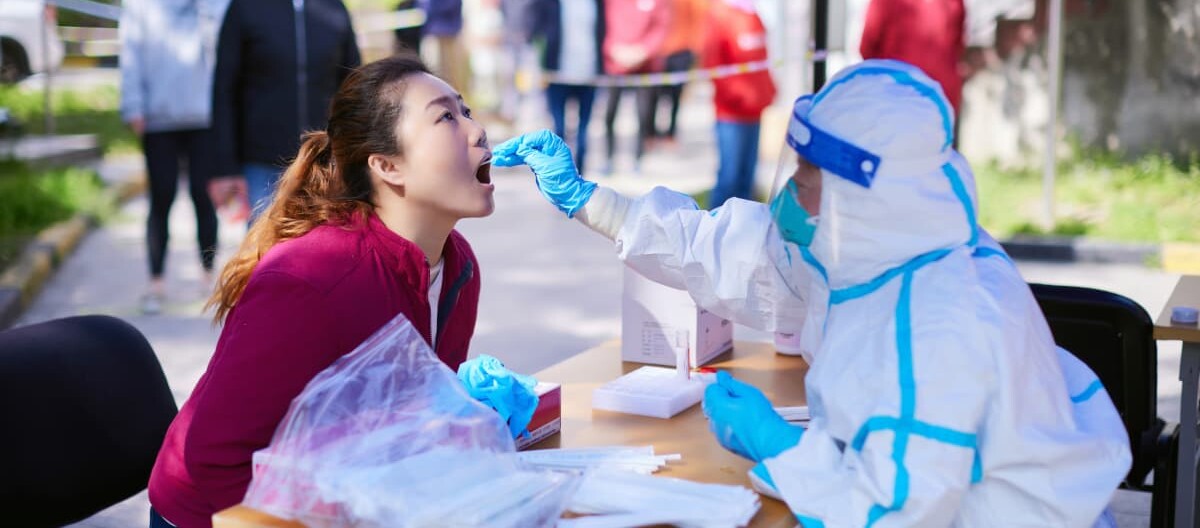The price of the long zero-covid policy
China had its first lockdown at the end of January 2020. Numerous others followed, as well as strict entry and exit rules. For a good three years, the state leadership adhered ironclad to these and other restrictions as part of its zero-covid strategy. One could also say that China closed up store - with far-reaching international consequences. Because many production facilities in the country repeatedly came to a standstill for long periods of time, the flow of goods slowed down and the transport of raw materials stopped. This had consequences all over the world, including Germany. Countless local companies received little or no supplies from Germany's largest trading partner and were forced to close or announce short-time working.
After ten years of steady economic growth, Germany's price-adjusted GDP fell by a good five percent in 2020. In 2021, the situation eased somewhat and GDP grew by around three percent year-on-year. China also saw a slow recovery after a slump. In 2022 as a whole, imports and exports developed slightly better: imports increased by 1.1 percent and exports by 7.0 percent year-on-year.
Overall, Beijing retrospectively expects growth of 5.5 percent in 2022. That may seem decent at first glance, but in actual terms it would be the lowest figure in 30 years. And experts are not sure whether this has been achieved at all. What is clear is that China's strict zero-covid strategy has cost the country and the global economy vast sums.
6 million professional buyers are waiting for you!
Present your product range online to buyers and make sure that your company is visible to the right people. Expand your international internet presence with the leading B2B platform in Europe. With a free profile on europages!
The turnaround and its consequences: Wave of infection burdens economy
Then, in December 2022, came the surprise: China abruptly ended its previous policy and lifted virtually all precautionary measures against Corona. The sudden change of course caught a largely unvaccinated population off guard. The country's National Health Commission counted a total of 59,938 fatal infections between Dec. 8, 2022, and Jan. 12, 2023. However, only cases within medical facilities were recorded. Thus, it is unclear how many people died in their homes or elsewhere from or with Covid-19. Foreign experts fear that by spring, about one and a half million people could die in connection with the Corona virus.
But despite the turnaround, the economy did not rebound: according to China Customs, exports fell 9.9 percent in December 2022 compared with the same month a year earlier. Imports shrank by 7.5 percent. This is partly due to a global drop in demand, but also because of the massive Corona infection wave following the repealed zero-covid strategy.
According to Kristalina Georgieva, head of the International Monetary Fund (IMF), Chinese economic growth could be lower than that of the global economy for the first time in 2022. And this is also due to the turnaround in the zero-covid strategy. Overall, experts expect annual growth of only two percent.
This is likely to have far-reaching consequences: According to IMF forecasts, 2023 will be more difficult economically than 2022 because the three major markets - the USA, the EU and China - are showing signs of weakness. Georgieva sees a sharp economic slowdown coming in China in particular.
Supply chains to Europe again at risk
If it was initially China's isolationism, now its departure from the zero-covid strategy may lead to bottlenecks in the international flow of goods. The Ifo Institute for Economic Research, for example, fears this. The first signals of this can be found in a survey of materials supply conducted by the Munich-based institution. In it, 50.7 percent of the companies surveyed reported shortages in December 2022. In the previous month, the figure was 59.3 percent. So are things getting better again? Yes and no.
"A resolution of the shortages now seems to be emerging in many sectors," says Klaus Wohlrabe, head of Ifo surveys. "This will support the economy in the coming months. Depending on the development of the Corona situation in China, however, there may be setbacks in the bottlenecks again."
Martin Wansleben, CEO of the German Chamber of Industry and Commerce (DIHK), takes a similar view: "However, the high corona figures in China and the associated production stoppages pose the risk of international supply traffic becoming more unbalanced again."
Companies should prepare for all eventualities and make their supplier management as broad and agile as possible. This is the only way to get a grip on possible new supply problems.

